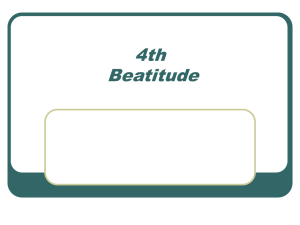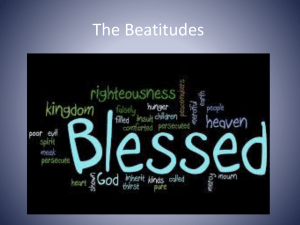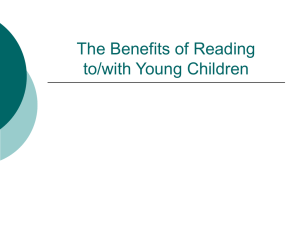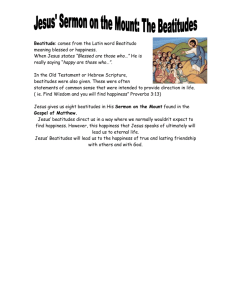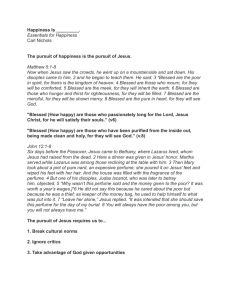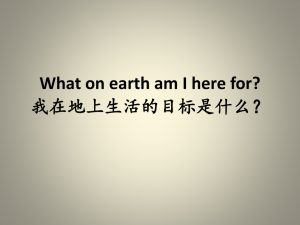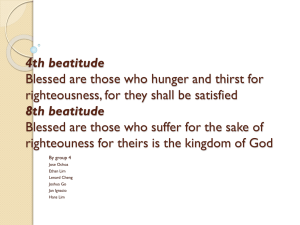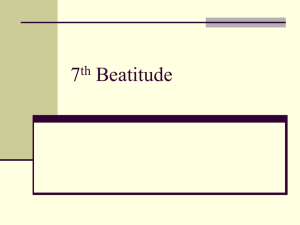Wisdom Circle Sparks
advertisement
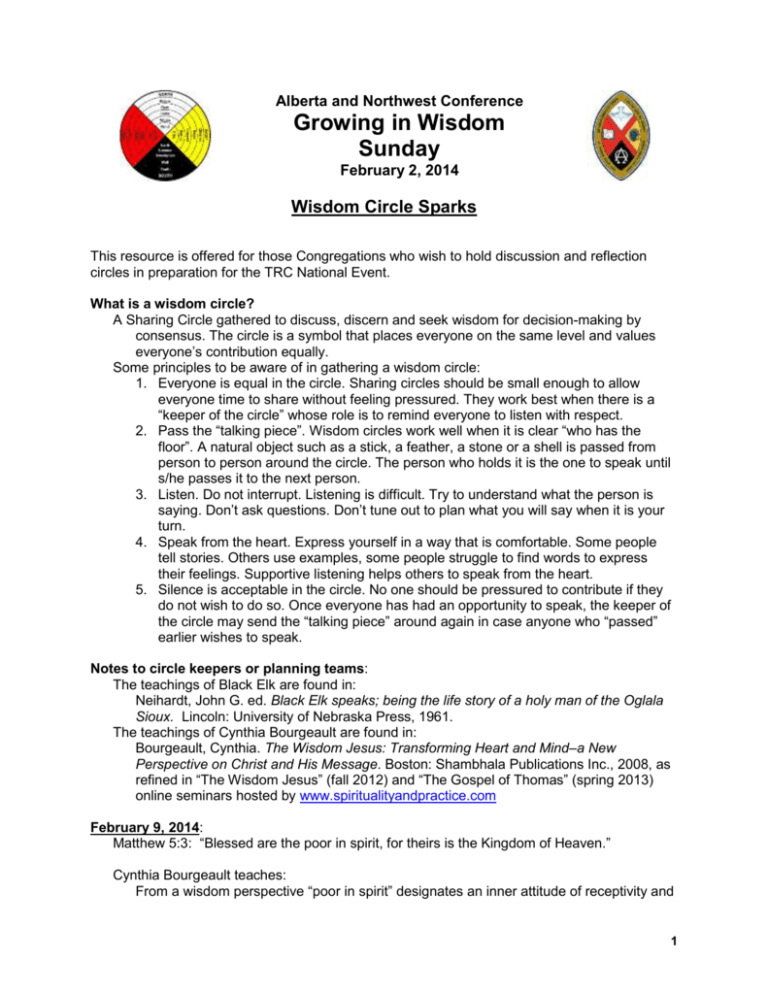
Alberta and Northwest Conference Growing in Wisdom Sunday February 2, 2014 Wisdom Circle Sparks This resource is offered for those Congregations who wish to hold discussion and reflection circles in preparation for the TRC National Event. What is a wisdom circle? A Sharing Circle gathered to discuss, discern and seek wisdom for decision-making by consensus. The circle is a symbol that places everyone on the same level and values everyone’s contribution equally. Some principles to be aware of in gathering a wisdom circle: 1. Everyone is equal in the circle. Sharing circles should be small enough to allow everyone time to share without feeling pressured. They work best when there is a “keeper of the circle” whose role is to remind everyone to listen with respect. 2. Pass the “talking piece”. Wisdom circles work well when it is clear “who has the floor”. A natural object such as a stick, a feather, a stone or a shell is passed from person to person around the circle. The person who holds it is the one to speak until s/he passes it to the next person. 3. Listen. Do not interrupt. Listening is difficult. Try to understand what the person is saying. Don’t ask questions. Don’t tune out to plan what you will say when it is your turn. 4. Speak from the heart. Express yourself in a way that is comfortable. Some people tell stories. Others use examples, some people struggle to find words to express their feelings. Supportive listening helps others to speak from the heart. 5. Silence is acceptable in the circle. No one should be pressured to contribute if they do not wish to do so. Once everyone has had an opportunity to speak, the keeper of the circle may send the “talking piece” around again in case anyone who “passed” earlier wishes to speak. Notes to circle keepers or planning teams: The teachings of Black Elk are found in: Neihardt, John G. ed. Black Elk speaks; being the life story of a holy man of the Oglala Sioux. Lincoln: University of Nebraska Press, 1961. The teachings of Cynthia Bourgeault are found in: Bourgeault, Cynthia. The Wisdom Jesus: Transforming Heart and Mind–a New Perspective on Christ and His Message. Boston: Shambhala Publications Inc., 2008, as refined in “The Wisdom Jesus” (fall 2012) and “The Gospel of Thomas” (spring 2013) online seminars hosted by www.spiritualityandpractice.com February 9, 2014: Matthew 5:3: “Blessed are the poor in spirit, for theirs is the Kingdom of Heaven.” Cynthia Bourgeault teaches: From a wisdom perspective “poor in spirit” designates an inner attitude of receptivity and 1 openness, and one is blessed by it because only in this state is it possible to receive anything. It's a pretty close equivalent to what the Buddhists call "beginner's mind. Black Elk teaches: “I knew that the real was yonder and that the darkened dream of it was here.” “It is hard to follow one great vision in this world of darkness and of many changing shadows. Among those, men get lost.” For discussion: Do you think we are open and receptive to living into "real" and right relationships, or are we still lost in our darkened dream? How might we become more open and receptive to God and to one another? Do you know of any spiritual practices or other actions that might lead us into the vision and openness of a beginner's mind? February 16, 2014 Matthew 5:5: “Blessed are the meek, for they will inherit the earth.” Cynthia Bourgeault teaches: A better translation of this Beatitude is: Blessed are the gentled. Blessed are the ones who have tamed the wild animal energy within them, the passions and compulsions of our lower nature. Only when we have dealt directly with our animal instincts and the pervasive sense of fear and scarcity that emerge out of our ego, are we truly able to inherit the earth rather than destroying it. Black Elk taught: Every little thing is sent for something, and in that thing there should be happiness and the power to make happy. Like the grasses showing tender faces to each other, thus we should do, for this was the wish of the Grandfathers of the World. Charles Alexander Eastman wrote: It was our belief that the love of possessions is a weakness to be overcome. Children must early learn the beauty of generosity. They are taught to give what they prize most, that they may taste the happiness of giving. The Indians in their simplicity literally give away all that they have - to relatives, to guests of other tribes or clans, but above all to the poor and the aged, from whom they can hope for no return. Charles Alexander Eastman (1858-1939) was Woodland Sioux, raised traditionally by his grandmother until he was 15. He went on to become a physician, and the only doctor available to the victims of the Wounded Knee massacre of 1890. For discussion: How have Indigenous/Non-indigenous relationship been driven by fear and a mentality of scarcity? How might we overcome the fear that is this inherent in these relationships? How might overcoming that fear and adopting a mindset of abundance enhance our relationships? February 23, 2014 Matthew 5:6: “Blessed are those who hunger and thirst for righteousness, for they will be filled.” 2 Cynthia Bourgeault teaches: The word “righteousness” is often taken as a synonym for virtue -- behaviour that is morally correct. But in Jesus' day, righteousness was so much more powerful than that. To be “in the righteousness of God” meant to be directly connected to God’s energy and aliveness. The experience is fierce and vibrant. When we “hunger and thirst after righteousness”, God is as near as our next breath. She goes on to say: Jesus promises that when the hunger arises within you to find your own deepest aliveness within God's aliveness, it will be satisfied -- in fact, the hunger itself is a sign that the bond is already in place. Some spiritual teachers claim that the yearning you feel for God is actually God's yearning for you. ‘The eye with which you see God is the eye with which God sees you,’ said Meister Eckhart, one of the greatest Christian mystics. Yearning is the vibration of that connectedness. In this beatitude Jesus is not talking about doing virtuous deeds so you'll be rewarded later; he is talking about being in connection with your own fundamental yearning for God. Black Elk teaches: The first peace, which is the most important, is that which comes within the souls of people when they realize their relationship, their oneness, with the universe and all its powers, and when they realize that at the centre of the universe dwells the Great Spirit, and that this centre is really everywhere, it is within each of us. For discussion: How might the 19th century Europeans’ need for maintaining their standards of "moral correctness" have discouraged right relationships with Indigenous peoples? How might differing mores still keep us from entering into right relationships? If we shift our understanding of “righteousness” from “morally correct” to a yearning which brings God as near as our next breath, how might that make relationship easier? March 2, 2014 Matthew 5:7: “Blessed are the merciful, for they shall receive mercy.” Cynthia Bourgeault teaches: We give mercy and we receive mercy in a single flowing motion. The word “mercy” comes from the root “merc”, which also gives us “commerce” and “merchant.” This beatitude is about exchange: Typically we think of the mercy of God as a kind of divine clemency, and we pray, “Lord have mercy upon us” as a confession of our weakness and dependency. But in this other understanding, mercy is not something God has; it's something that God is. Exchange is the very nature of divine life -- of consciousness itself -- and all things share in the divine life through participation in this dance of giving and receiving. Surely Jesus knew this as well, and his teaching in this beatitude -- that all things share in the divine life through participation in this dance of giving and receiving -- he invites us into a deeper trust of that flow. Lakota Prayer: Great Mystery, teach me how to trust my heart, my mind, my intuition, my inner knowing, the senses of my body, the blessings of my spirit. 3 Teach me to trust these things so that I may enter my Sacred Space and love beyond my fear, and thus Walk in Balance with the passing of each glorious Sun. For discussion: When the first settlers came to Canada, there was a generous flow of giving and receiving between many Indigenous and Non-Indigenous peoples. How has that flow dried up between Indigenous and Non-Indigenous peoples over the years? How might that have interfered with the sacred balance of creation and right relationships? How might the generous flow be restored? March 9, 2014 Matthew 5:8: “Blessed are those whose heart is pure, for they shall see God.” Cynthia Bourgeault teaches: For most people, purity of heart means to be virtuous, or chaste or perhaps even celibate. But in Wisdom teaching, purity means singleness, that is, “Blessed are those whose hearts have become single." One of the earliest titles applied to Jesus by his immediate Aramaic-speaking followers was “Ihidaya”, which means the single or enlightened one. According to Jesus, when your heart becomes “single” -- that is, when you live within that resonant field of mutual yearning we called “the righteousness of God”, when you can live without clinging, hoarding, bracing, or defending -- then you “see God.” So this beatitude is not about morality, it's about seeing God and the world in a non-dual way. Black Elk teaches: I stood there and I saw more than I can tell, and I understood more than I saw; for I was seeing in a sacred manner the shapes of things in the spirit, and the shape of all shapes as they must live together like one being. For discussion: How might IRS’s have hindered the ability of their students to “see God”? How might the ability of Non-indigenous Canadians to “see God” have also been hindered by our wholesale rejection of Indigenous spirituality? How might becoming more “single” -- i.e. dropping the judging and duality of right/wrong, us/them, orthodox/non-orthodox belief -- allow us to walk together and “live together like one being”? March 16, 2014 Matthew 5:9: “Blessed are the peacemakers, for they will be called children of God.” Cynthia Bourgeault teaches: This beatitude follows as the logical consequence of all that Jesus has laid out so far. When our hearts are gentled and single, when we've tamed the animal instincts, we become peacemakers, when we are no longer wielding the sword of the duality that divides the world into good guys and bad guys, insiders and outsiders, winning team and losing team. When the field of vision has been unified, the inner being comes to rest, and that inner peaceableness flows into the outer world as harmony and compassion. 4 Chief Crowfoot teaches: What is life? It is the flash of a firefly in the night. It is the breath of a buffalo in the wintertime. It is the little shadow which runs across the grass and loses itself in the sunset. Chief Joseph said: “I believe much trouble and blood would be saved if we opened our hearts more.” For discussion: How does letting go of right/wrong, good/bad, us/them assist us in walking together in right relationship? Do you think we are finally ready to open our hearts and let peace flow? What would harmony look like to you? March 23, 2014 Matthew 5:10: “Blessed are those who are persecuted for righteousness’ sake, for theirs is the Kingdom of Heaven.” Cynthia Bourgeault teaches: Jesus is not talking about martyrdom here, but about freedom. The gospel of Thomas records this beatitude with a slight but telling variation that captures the very essence of Jesus' meaning here -- and in fact, throughout the beatitudes: ‘Blessed are you in the midst of persecution who, when they hate and pursue you even to the core of your being, cannot find “you” anywhere.’ (Lynn Bauman, translator) Talk about freedom! Whatever this elixir of pure liberation may be, it is what the journey is all about. And it is attained gradually within us -- distilled drop by drop from the terror and turmoil of our ego as we learn to let go and entrust ourselves to the divine mercy. Situations of persecution (or anything else that shakes us out of our comfort zone) can become great teaching tools if we have the courage to use them that way. Black Elk teaches: When a vision comes from the thunder beings of the west, it comes with terror like a thunder storm; but when the storm of vision has passed, the world is greener and happier; for wherever the truth of vision comes upon the world, it is like a rain. The world, you see, is happier after the terror of the storm. For discussion: There are many still standing after the storm. Many former IRS students and their descendants have maintained (or regained) their symbols and traditions, their dignity and spirit. Now that the IRS’s are gone, and the terrible storm has passed, is it possible to use the terror of our history of IRS’s as a tool for moving forward? Might the stories and tears shared at the TRC serve to heal our relationships? With a truer, clearer vision, do you believe it might be possible to walk together into a greener world, into the Kingdom of God? Somehow Carolyn McDade’s song, “Now, You can Go On” seems fitting here. 5
